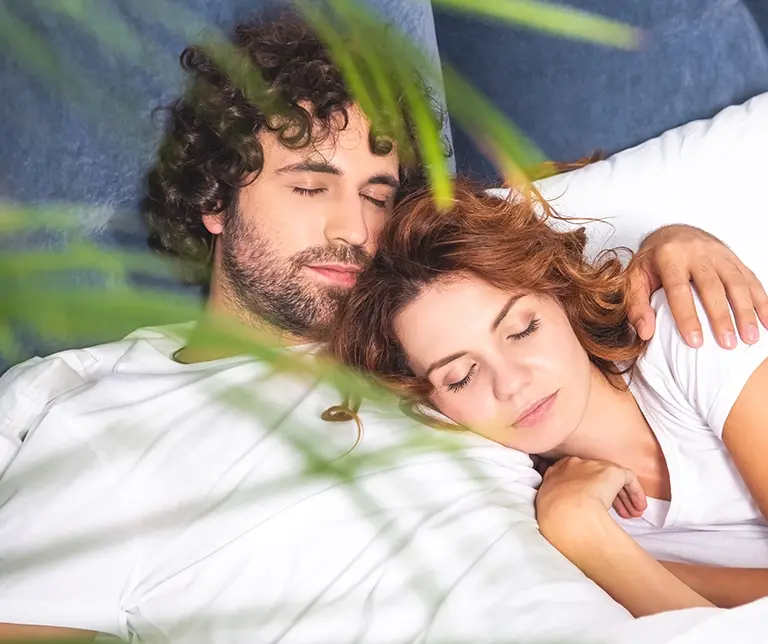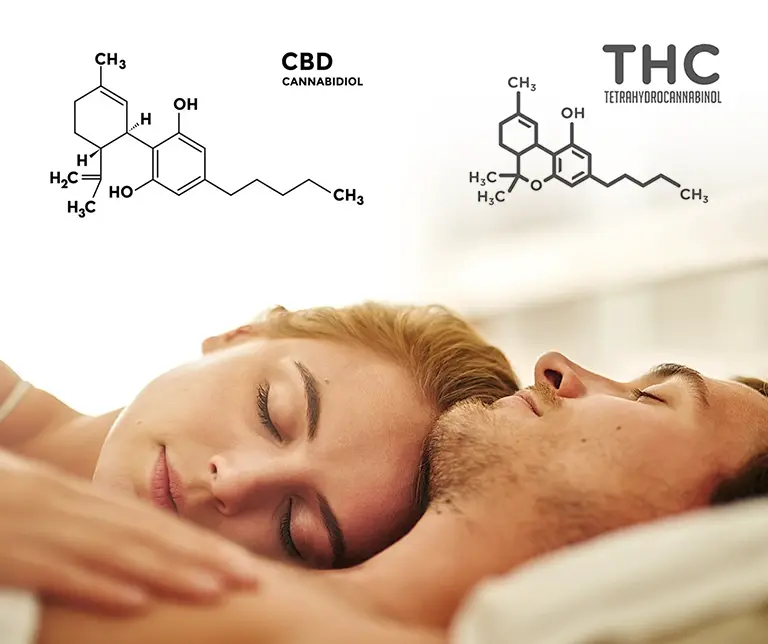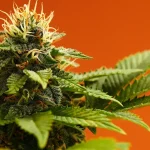Sleep is a vital component of our well-being, and finding the right aid can make a world of difference. In the quest for better sleep quality, the choice between CBD and THC can seem daunting. Understanding their differences and how they affect sleep can help you make an informed decision tailored to your needs.
Whether you prefer the non-psychoactive relaxation of CBD or the direct sleep-inducing effects of THC, exploring various administration methods and considering other cannabinoids like HHC, THCA, and CBG can lead you to a path of more restful nights.
CBD or THC for Better Sleep Quality
When deciding whether THC or CBD is better for improving sleep quality, it’s important to understand that there is no universal solution. Your choice should be based on your individual needs and preferences. While both CBD and THC products can be effective in enhancing sleep, they work differently to address various sleep issues.
CBD and Sleep
Hemp-derived CBD products are a reliable and effective sleep aid primarily because they lack psychoactive effects. Cannabidiol (CBD) produces sleep-inducing effects without altering one’s state of mind. This makes CBD a suitable option for individuals who seek the therapeutic benefits of cannabis without the high.
CBD interacts with the body’s endocannabinoid system to promote relaxation, reduce anxiety, and alleviate pain, all of which can contribute to improved sleep quality. By addressing underlying issues such as stress and chronic pain, CBD helps to create an environment conducive to restful sleep.
THC and Sleep
On the other hand, THC is ideal for those who need a natural sleep aid that directly induces sleepiness while experiencing some psychoactive effects. THC products can be particularly beneficial for people with specific sleep disorders, such as insomnia.
Medical cannabis, which contains THC, has been the subject of numerous research studies showing its potential to address sleeplessness, a common issue among Americans due to stress and anxiety. THC is known for its ability to help people fall asleep faster and enjoy deeper sleep stages.
However, the psychoactive effects, including the characteristic “head-high,” may not be suitable for everyone.
Choosing Between CBD and THC
THC is typically sourced from cannabis plants, which contain high quantities of this psychoactive cannabinoid. Conversely, CBD is generally obtained from hemp plants, a specific variety of the cannabis sativa plant.
Both compounds have been shown to alleviate persistent discomfort, leading to better sleep quality. However, the psychoactive nature of THC means that its use for sleep might come with additional considerations, such as potential side effects and legal implications.
Ultimately, the decision between THC and CBD products should be made in consultation with your doctor. A healthcare professional can provide personalized advice based on your medical history, current medications, and specific sleep-related issues. This tailored approach ensures that you choose the most appropriate and effective solution for your unique sleep needs.
Methods of Administration for CBD and THC to Achieve Quality Rest
CBD Methods of Administration
CBD Oil and Tinctures:
- Sublingual Use: Placing a few drops under the tongue allows for quick absorption into the bloodstream. This method is fast-acting and can help induce relaxation before bedtime.
- Mixed with Food or Drink: Adding CBD oil to food or beverages can be convenient, though the effects may take longer to kick in due to digestion.
CBD Capsules and Edibles:
- Capsules: These offer a precise dosage and are easy to incorporate into a nightly routine. The onset is slower as they need to be digested first.
- Edibles: Gummies and other edible forms provide a tasty way to consume CBD, with effects typically felt within 30 minutes to two hours.
CBD Topicals:
- Lotions and Balms: Applied directly to the skin, these can help with localized pain relief, which may contribute to better sleep if discomfort is the issue.
CBD Vapes:
- Inhalation: Vaping CBD oil results in rapid absorption through the lungs, providing quick relief. However, this method might not be suitable for everyone, particularly those with respiratory concerns.
THC Methods of Administration
THC Oil and Tinctures:
- Sublingual Use: Similar to CBD, THC tinctures can be placed under the tongue for fast absorption and quick effects, ideal for inducing sleepiness.
THC Edibles:
- Gummies and Baked Goods: These provide a long-lasting effect, making them suitable for maintaining sleep through the night. Onset can take 30 minutes to two hours.
THC Capsules:
- Capsules: Offer precise dosing and are discreet, though they also require digestion, which delays the onset of effects.
THC Vapes:
- Inhalation: Provides almost immediate effects, which can be useful for those needing quick relief from insomnia. However, similar to CBD vapes, this method may not be appropriate for individuals with lung conditions.
THC Flower:
Smoking: Traditional smoking of cannabis flower allows for rapid onset of effects. This method can be effective but carries risks associated with smoking.
Important Considerations
Onset and Duration: Consider how quickly you need relief. Vapes and tinctures offer faster onset, while edibles and capsules provide longer-lasting effects.
Dosage: Start with a low dose and gradually increase to find the optimal amount that improves sleep without causing adverse effects.
Psychoactive Effects: THC induces psychoactive effects, which may not be suitable for everyone. CBD, being non-psychoactive, is often preferred by those looking to avoid a “high.”
Legal Status: Ensure the legality of CBD and THC products in your region. CBD derived from hemp is widely legal, while THC legality varies.
Quality and Source: Use products from reputable sources to ensure purity and potency. Look for third-party lab testing results to verify product quality.
Medical Advice: Consult with a healthcare provider before starting CBD or THC, especially if you are taking other medications or have underlying health conditions.
By understanding these administration methods and considerations, you can make a more informed decision about using CBD or THC to achieve quality rest.
Other Cannabinoids that Can Help You Sleep
HHC
Hexahydrocannabinol (HHC) is an emerging cannabinoid that has shown promise in enhancing sleep quality. Similar to other cannabinoids, HHC interacts with the body’s endocannabinoid system, which plays a role in regulating various physiological processes, including sleep.
Calming Effects and Stress Reduction
Studies have demonstrated that HHC can have a calming effect on the body, contributing to deeper and more restful sleep. By reducing stress and promoting relaxation, HHC helps individuals fall asleep faster and sleep longer. Users often report improved sleep quality and a reduction in sleep disorders, highlighting HHC’s potential as a natural sleep aid.
Resetting Natural Sleep Cycles
HHC is believed to help reset the body’s natural sleep cycle, which is crucial for maintaining healthy sleep patterns. This regulatory effect on sleep cycles can be particularly beneficial for those experiencing insomnia or other sleep-related issues. By normalizing sleep patterns, HHC may help users achieve more consistent and restorative sleep.
THCA
Tetrahydrocannabinolic acid (THCA) is the precursor to THC, the well-known psychoactive compound in cannabis. While THCA itself is non-intoxicating, it has shown promise for certain health benefits, including potential applications for sleep-related issues. However, research on THCA is still in its early stages, and more studies are needed to fully understand its effects on sleep.

Potential Benefits of THCA for Sleep
Neuroprotective Qualities:
THCA has been noted for its potential neuroprotective properties. These qualities may help with overall brain health and could indirectly support better sleep by promoting a healthier central nervous system.
Anti-Inflammatory Properties:
THCA is known for its anti-inflammatory effects. By reducing inflammation, THCA can alleviate discomfort and pain that might otherwise interfere with sleep, leading to a more restful night.
Milder Alternative:
Since THCA is non-intoxicating, some users prefer it over delta-9 THC for sleep. It provides a milder alternative, especially for those who are sensitive to the psychoactive effects of THC.
CBG
Cannabigerol (CBG) is a lesser-known cannabinoid that is gaining attention for its potential health benefits, including its ability to promote restful sleep. While CBG doesn’t directly cause drowsiness, it may improve sleep quality by addressing underlying issues such as anxiety and inflammation.
Potential of CBG to Promote Restful Sleep
CBG itself does not induce sleep, but its calming effects on the body can contribute to a more restful night. Here’s how CBG products may help:
Anxiety Reduction:
- Anti-Anxiety Effects: Studies have shown that CBG can have anti-anxiety effects. Since anxiety is a major cause of sleep disturbances, alleviating anxiety with CBG can indirectly improve sleep.
- Link Between Anxiety and Sleep: A research review from 2003 highlighted a strong correlation between anxiety disorders and sleep disturbances such as insomnia. If CBG can effectively reduce anxiety, it may help improve sleep quality by extension.
Inflammation Reduction:
- Anti-Inflammatory Properties: CBG has demonstrated significant anti-inflammatory properties. By reducing inflammation, CBG can help alleviate discomfort and pain that might otherwise disrupt sleep.
Survey Findings on CBG and Sleep
In late 2022, a survey was conducted among CBG users to gather anecdotal evidence on its effects on sleep. Here are some key findings:
- Preference Over Traditional Medicines: Of the 127 U.S.-based participants who had used CBG in the past six months, 30.7% reported using it for insomnia or sleep disturbances. Remarkably, 73% of respondents indicated that CBG-predominant products worked better than conventional medicines for insomnia.
- Improved Sleep Quality: The survey revealed that a significant number of users found CBG to be beneficial for improving their sleep quality, suggesting that CBG may help with sleep indirectly by addressing factors like anxiety and inflammation.
Useful Tips for a Good Sleep
Achieving good sleep is essential for overall health and well-being. Aside from consuming hemp-based cannabinoids, here are some practical tips to help you get better rest:
Maintain a Consistent Sleep Schedule
- Go to Bed and Wake Up at the Same Time: Try to keep a regular sleep schedule, even on weekends. This helps regulate your body’s internal clock.
- Consistency is Key: Being consistent with your sleep times can significantly improve the quality of your sleep.
Create a Relaxing Bedtime Routine
- Wind Down Before Bed: Engage in relaxing activities like reading, listening to soothing music, or taking a warm bath.
- Avoid Stimulants: Avoid caffeine, nicotine, and heavy meals at least a few hours before bedtime.
Optimize Your Sleep Environment
- Comfortable Bedding: Ensure your mattress and pillows are comfortable and supportive.
- Dark, Cool, and Quiet Room: Use blackout curtains, earplugs, or white noise machines to create a sleep-conducive environment. Keep the room cool and well-ventilated.
Limit Exposure to Screens Before Bed
- Reduce Blue Light: The blue light from phones, tablets, and computers can interfere with your sleep. Try to avoid screens at least an hour before bed.
- Use Night Mode: If you must use electronic devices, enable night mode or blue light filters.
Watch What You Eat and Drink
- Limit Caffeine and Alcohol: Both can disrupt your sleep patterns. Avoid consuming them too close to bedtime.
- Stay Hydrated: Drink enough water throughout the day but avoid large quantities close to bedtime to minimize nighttime awakenings.
Be Mindful of Naps
- Short and Early Naps: If you need to nap, keep it short (20-30 minutes) and avoid napping late in the afternoon.
Exercise Regularly
- Daily Physical Activity: Regular exercise can help you fall asleep faster and enjoy deeper sleep. However, avoid vigorous workouts close to bedtime.
Manage Stress and Anxiety
- Relaxation Techniques: Practices like meditation, deep breathing exercises, and yoga can help calm your mind before bed.
- Journaling: Writing down your thoughts and worries before bed can help clear your mind and reduce stress.
Consider Your Sleep Position
- Comfortable Position: Find a sleep position that is comfortable and supports good posture to avoid waking up with aches and pains.
Seek Professional Help if Needed
- Consult a Doctor: If you have chronic sleep problems or suspect a sleep disorder, such as sleep apnea, seek advice from a healthcare professional. They can provide tailored recommendations and treatments.
Frequently Asked Questions
Is CBD legal?
CBD derived from hemp (containing less than 0.3% THC) is federally legal in the United States, but state laws can vary. It’s important to check your local regulations regarding CBD products.
Is THC legal?
THC is federally illegal in the United States but is legal for medical and/or recreational use in various states. The legality varies significantly from state to state, so you should verify the laws in your specific location.
How much CBD should I take for sleep?
The optimal dosage of CBD for sleep can vary depending on individual factors such as body weight, metabolism, and the severity of sleep issues. A common starting dose is between 25-30 mg taken 30 minutes to an hour before bedtime. It’s advisable to start with a lower dose and gradually increase until you find the amount that works best for you.
How much THC should I take for sleep?
For those new to THC, starting with a low dose of 2.5-5 mg is recommended to gauge its effects. More experienced users might find doses in the range of 5-10 mg effective. It’s best to start low and increase slowly, as THC can have potent psychoactive effects and its impact on sleep can vary from person to person.
Where can I buy CBD and THC products for sleep?
XLR8 Delta is a leading online store that specializes in selling federally legal CBD and THC products. They provide Certificates of Analysis (COAs) to prove the potency and purity of their products, ensuring quality and safety. XLR8 Delta offers affordable CBD and THC goods without compromising on quality, making them a trusted choice for consumers seeking reliable options.
References:
The Effects of Cannabinoids on Sleep; Bhanu Prakash Kolla, Lisa Hayes, Chaun Cox, Lindy Eatwell, Mark Deyo-Svendsen, and Meghna P. Mansukhani (https://www.ncbi.nlm.nih.gov/pmc/articles/PMC9036386/)
Cannabidiol for moderate–severe insomnia: a randomized controlled pilot trial of 150 mg of nightly dosing; Andrea J. Narayan, BPsych (Hons), Luke A. Downey, PhD, Sarah Rose, BPsych (Hons), Lauren Di Natale, BPsych (Hons), Amie C. Hayley, PhD (https://doi.org/10.5664/jcsm.10998)
Cannabidiol in Anxiety and Sleep: A Large Case Series; Scott Shannon, MD, corresponding author Nicole Lewis, ND, Heather Lee, PA-C, and Shannon Hughes, PhD (https://www.ncbi.nlm.nih.gov/pmc/articles/PMC6326553/)
Cannabis use in patients with insomnia and sleep disorders: Retrospective chart review; Régis Vaillancourt, BPharm, PharmD, FCSHP, Shannon Gallagher, PharmD, RPh, Jameason D. Cameron, MSc, PhD, and Rahim Dhalla, PharmD, MBA, RPh (https://www.ncbi.nlm.nih.gov/pmc/articles/PMC9067069/)
The Use of Cannabinoids for Insomnia in Daily Life: Naturalistic Study; Nirushi Kuhathasan Author Orcid Image ; Luciano Minuzzi1, Author Orcid Image ; James MacKillop, Author Orcid Image ; Benicio N Frey (https://www.jmir.org/2021/10/e25730/)




